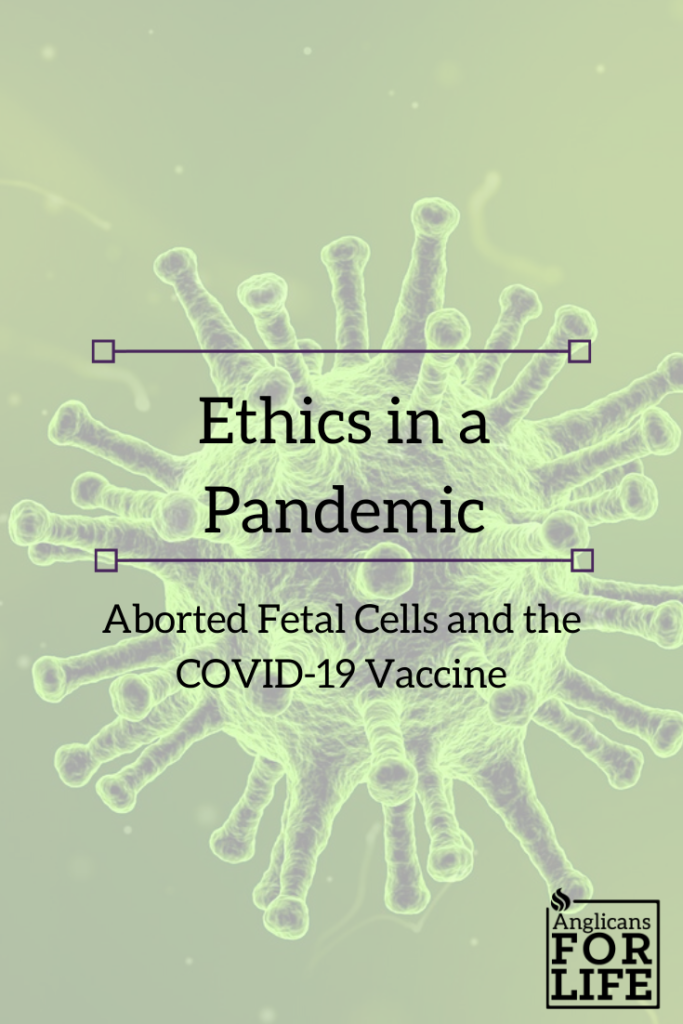
The world as we know it has been thrown into confusion during this COVID-19 pandemic. Many of us are concerned about the unemployment rate, the economy, and the health of our family and loved ones. It is unsurprising then that people are increasingly looking with hope at the potential of a COVID-19 vaccine. However, as much as one can understand the desire for a swift answer to this global pandemic, we as the Church need to be aware of the moral and ethical quandaries brought up in this vaccine-producing fervor, specifically related to the use of aborted fetal cells in vaccine research.
The utilization of embryonic and fetal cells from elective abortions in the pharmaceutical industry, including in the creation of vaccines, is unfortunately commonplace, and Christian people have sought an ethical response. The position of The National Catholic Bioethics Center (NCBC) is that individuals should, when possible, use vaccines not developed with the use of these strains. However, in the case where the only vaccine available against a particular disease was developed using fetal cells it states that: “One is morally free to use the vaccine regardless of its historical association with abortion. The reason is that the risk to public health, if one chooses not to vaccinate, outweighs the legitimate concern about the origins of the vaccine. This is especially important for parents, who have a moral obligation to protect the life and health of their children and those around them.” Examples of such vaccines are those protecting against rubella, chickenpox, and hepatitis A.
Recently, Life Issues Institute wrote about researchers James L. Sherley, MD, PhD and David A. Prentice, PhD who have analyzed the vaccines in question and provided us with a list of ethical and unethical COVID-19 vaccines.
Here is a snapshot of the current status of COVID-19 vaccines:
- 115 identified vaccines are in development
- At least 78 of them are actively under way
- Many are only at the laboratory investigation stage
- They represent numerous biological strategies being investigated
- 16 are in registered clinical trials or in an early pre-clinical trial stage
Much more information is available in the research paper authored by Drs. Sherley and Prentice. And it is important to note that of the 16 COVID-19 vaccines referenced above, five companies such as Janssen Research and Development have used an abortion-derived cell line.
Fortunately, it is possible to manufacture a vaccine that does not make use of aborted fetal cells. For instance, Sanofi-Pasteur is using its own recombinant DNA platform to produce its vaccine. They have created a DNA platform which utilizes insect cells, specifically the fall armyworm, as its base. The technology produces an exact genetic match to proteins found on the surface of the virus, which could enable the introduction of a vaccine even faster than one produced traditionally. Debi Vinnedge, commenting on the Sanofi process, stated: “This is great news for millions of people world-wide who are concerned with the use of aborted fetal material in life-saving treatments or vaccines. There is a multitude of moral options that are safer and quite frankly, utilize more modern technology.”
While the vaccines are still in the development and/or trial stage, life-affirming people should discourage pharmaceutical companies from utilizing fetal cell strains and our government from supporting such development. Although we have been focused specifically on the COVID-19 vaccine, the ethical implications of the use of aborted fetal cells are long-reaching. Each medical benefit or scientific advance gained through the use of fetal tissue desensitizes the beneficiaries, scientists, and doctors to the original evil act that produced these cells. Aborted fetal tissues used in laboratories are minimized and treated merely as “human cells,” and the human beings whose lives were taken to provide those cells become irrelevant. The greatest concern is that desensitization will erroneously validate elective abortions, so much so that they will be perceived in the scientific community as a societal “good.” Absent careful oversight, the unborn could become, like fetal tissue cell lines, merely cells, cultured within the uterus of a woman to be used for scientific exploration.
Anglicans for Life believes that every human being is created in the image of God and has value from the moment of conception. Abortion, and anything that fosters or encourages abortion, is morally illicit and must be resisted. Therefore, all people of good conscience, even during this pandemic, have the responsibility to voice opposition to the use of fetal tissue from elective abortions in the creation of a vaccine, in order to promote the development of ethical alternatives and to affirm the value of all human life.
To that end, AFL encourages you to contact the U. S. Food and Drug Administration and urge them to ensure that vaccines developed to combat the COVID-19 are not “morally compromised” by any connection to cell lines created from the remains of aborted babies.
